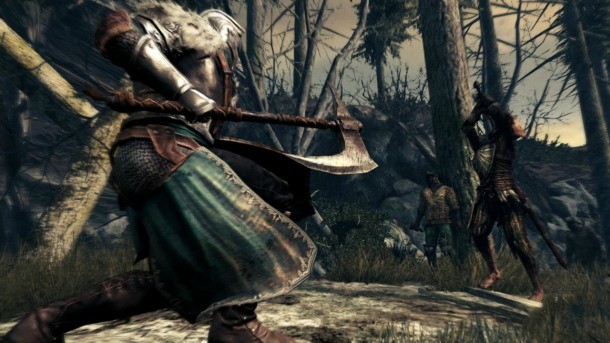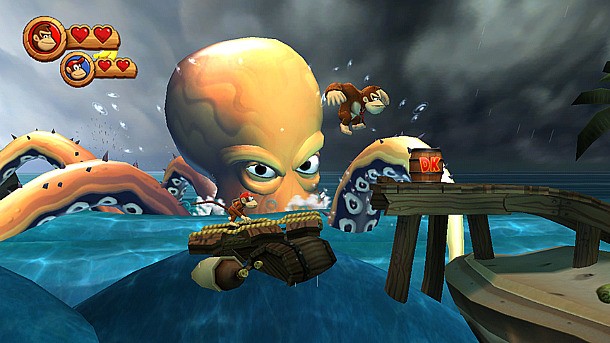Please support Game Informer. Print magazine subscriptions are less than $2 per issue
Do Gamers Really Like Hard Games?

Conventional wisdom would say that people enjoy games the most when they feel like they are good at them and when their skill exceeds they challenge they face. However, the rise in popularity of legendarily challenging titles such as the Dark Souls series, Donkey Kong Country Returns, and even Super Meat Boy has us wondering if it's as simple as that.
When it comes to games, I’m no slouch; during my video game tenure, I’ve beaten difficult titles such as Super Mario Bros.: The Lost Levels, Ninja Gaiden Black, F-Zero GX, Donkey Kong Country Returns, and most recently Dark Souls II (though some would argue it's not hard). However, like many gamers, I didn't understand the appeal of Dark Souls II at first. It was challenging, sure, but it also didn't explain itself to the player very well. There were many systems within that title that you had to experiment with in order to understand them. However, after a few hours with the game I found myself hooked – not because I was breezing through the game, but because the titles (often frustrating) challenge offered up a highly stimulating reward.
In order to better understand why gamers are sometimes drawn to challenging experiences, I talked with Dr. Scott Rigby, president of Immersyve, a research firm that has worked with companies like Warner Bros., Electronic Arts, and Disney to help them understand player motivation for over a decade. I have previously talked with Rigby about what drives us to play games, and he was eager to share some of his findings regarding game difficulty.
"Decades of research on what energizes us intrinsically show repeatedly that we have a basic need to grow our abilities, to integrate new experiences, learning and improving as we go along," says Rigby. "We can see this in our pursuit of challenges in games, but just as easily in our pursuit of excellence playing soccer with friends, or seeking out new challenges at work, etc. We like it because success at a challenge satisfies this basic need to feel mastery and growth – a need that has energized us for thousands of years to keep exploring, innovating, and tackling new frontiers."

However, Rigby continued to explain that, for some people, failure provides additional information about how to succeed the next time. Gamers seem especially skilled at getting up, brushing themselves off, and trying a new tactic that leads to victory. Games, in turn, give players strong “informational feedback” that helps them find these path to success.
"At the same time, if we feel a challenge is not within our reach – if it is pushing us too hard – we will disengage," says Rigby. "One way we see this in video games is in boss battles: In our data, across many different titles, after around the fourth 'death,' there is a massive spike in churn-out. Players hit the off button in greater numbers, and many won’t come back. Simply put, the psychological experience happening in the brain is something like this: 'The challenge is not optimal for me. It is too much and it is causing anxiety. My need for mastery is only going to continue to be frustrated. See ya…'”
Rigby was also happy to point out that challenging games don't appeal to as wide a market as some might think. "Every study Immersyve has ever done over the past 10 years (literally thousands of gameplay testing hours) has looked at enjoyment as a function of the player’s perception of feeling effective/masterful in overcoming game challenges," says Rigby. "And this data shows that high difficulty is a niche value. There is a small percentage of the overall player population that genuinely enjoy highly difficult games because they find it satisfying to the psychological need we all have to feel masterful. But the vast majority of gamers – even avid gamers that are playing many hours each week – do not stay engaged with highly difficult games, or even want to re-engage after one game session (even if during that session they feel it was fun). By contrast, most players want to have some bursts of higher challenge, but find satisfaction of their mastery needs mainly through long plateaus of gameplay that allow them to easily face-plant challenges."
In short, while games like Dark Souls II and Bloodborne are spearheading this renaissance, it's not likely that their popularity will ever achieve the same level as titles like Call of Duty or Grand Theft Auto, because their fan base is composed of only a portion of the overall gaming market. Is that bad? Of course not. There is no shame in giving up on a game that's causing driving you to frustration; that's actually a normal response to a challenging game. The moral: find the challenge that perfectly fits your skill, and enjoy your games. That's what games are for.










